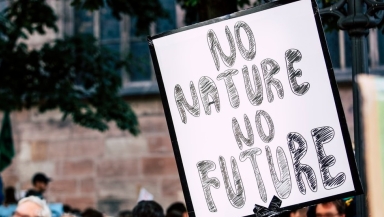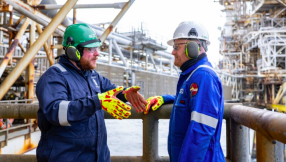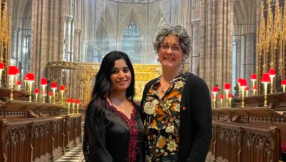
A book was just published that makes for alarming holiday reading. The book is titled Hothouse Earth: An Inhabitant's Guide and its author is Bill McGuire, emeritus professor of geophysical and climate hazards at University College London.
After the hottest temperature ever recorded in the UK (40.3C in eastern England on 19 July), and with ongoing weeks of dry weather threatening drought, the stark message of the book is that there is now no chance of avoiding an all-pervasive climate breakdown. We have passed the point of no return. Now, we must focus on coping and trying to stop it getting even worse. In short, the future is grim – but survivable if we embrace radical action fast.
To achieve that, the global community needs to confront ignorance, inertia, short-termism, self-serving governments, inadequate policies, and the claims of climate change deniers that range from the delusional to the plain dishonest. As McGuire puts it bluntly: "Use your vote wisely to put in power a government that walks the talk on the climate emergency." Reading it might spoil a hot day on the beach.
Now, not every climate change expert draws as pessimistic a conclusion as the writer of Hothouse Earth, but the bottom line is clear: we are in trouble. The science is undeniable and lived experience is proving it. The world faces an accelerating process of extreme weather events as a direct result of climate change caused by human activity. And the "window of opportunity" to do something to mitigate these changes is closing – and closing fast.
Ignorance is not bliss...
About fifteen years ago, I recall thinking about global warming and pondering that, while it had to be robustly confronted, there were worse things than living in a Mediterranean climate. After all, millions went there every year to enjoy the experience of reliable sunny days, warm waters, and relaxation. However, I had forgotten five rather important things.
The first was: if it's that warm here, the weather will soon be intolerable in places where it is currently already hot. If we think there is a migration crisis now, it is nothing compared to what will occur when huge areas of the globe become uninhabitable and nations go to war over access to water, as they once did over natural resources such as oil and gas.
The second was: global warming leads to weather extremes: storm, flood, and drought - not just warmer days. The outcome of global warming is not more days on a sun lounger, but destruction and chaos caused by extreme weather events.
The third was: the world's poorest countries face the highest costs adapting to climate change. Tearfund's recent research report, Dying to Adapt, warns of funds in these nations being diverted from crucial public services like healthcare. As a result, millions more people will be pushed even further into poverty.
The fourth was: ecological meltdown threatens vast numbers of species that have spent thousands of years adapting to specific climates since the end of the last Ice Age (about 10,000 years BC).
And fifthly, the world may not realise it's time to stop warming when Bournemouth is like Sorrento. It may just keep getting hotter.
I am ashamed of my previous thoughtlessness and ignorance. The only consolation is that I rapidly realised the baseless nature of my once-consoling thoughts. The world is in trouble.
Arranging deckchairs on the Titanic?
It was while the heat broke records in the UK, that I noticed something rather odd in UK politics. As I watched the Conservative Party decide who will be the future Prime Minister of the nation, and as two emerged as the ones whose names will go before party members, I was suddenly struck by something missing, or muted, in the presentations of these final two contenders.
It was a case of "the dog that didn't bark in the night." This is a point made by Sherlock Holmes in Sir Arthur Conan Doyle's story Silver Blaze. The fact that the dog didn't bark – when a racehorse was stolen – told the detective a lot about what was going on. The absence spoke loudly. Regarding the political debate, the "dog" was not entirely silent, but seemed to reserve most of the "barking" for other issues!
You will have guessed it. The thing that was so low on the agenda was climate change. Not much has been spoken about it, in stark contrast to other political and economic issues. It was as if the two final candidates had decided that the topic was of little interest to a particular demographic and ideological outlook. How else to interpret the lack of energetic engagement with the existential threat that is facing the planet and humanity? Polling seems to bear this out, with a mere 4% of Conservative Party members surveyed by the pollster YouGov saying that hitting the UK's Net Zero emissions target by 2050 was one of their top three priorities for the next PM.
Commissioned by the Times, the survey found that winning a general election, cutting taxes, increasing defence spending, and strengthening the UK's global position were all more important to these party members who will be choosing the next party leader and PM. Regarding the 10 policy areas listed in the survey, reaching Net Zero was placed bottom.
Both candidates, it must be said, have publicly endorsed a commitment to "Net Zero," but both seemed to be more committed to growth than radical action on the subject. It has also been noted that some of the most prominent Net-Zero-sceptics are among Truss' supporters. So, maybe "the dog not barking [much] in the night" is, indeed, rather revealing. Truss is currently predicted to beat Sunak to become PM.
Furthermore, a review of the environmental voting record of both candidates, by The Scotsman newspaper, arguably indicated that neither Sunak nor Truss had a reassuring record overall. If the maths are correct, that is rather worrying.
As I was thinking about this, something arrived in my Inbox. It was a report from "openDemocracy," reporting that US right-wing think tanks, funded by fossil fuel interests and pursuing a hard-line free market agenda, had met with Truss while she was a treasury minister in 2018, and again in 2019 when she was international trade secretary. While the meetings were primarily focused on trade, it should be noted that these US groups led the way in opposing environmental and climate legislation under President Obama. In the US climate change policy has become highly polarised as part of the "culture wars" there.
These meetings were reported at the time, but there is now renewed interest in them, given the current state of the climate crisis, the track record of these groups on environmental and climate issues, and the low profile of climate concerns in the current Conservative leadership debate.
When asked if people in the UK should be concerned about the possible implications of links with such groups for the future of UK climate-change-policy, Jonathan Phillips (who advised the US House of Representatives' climate committee) replied: "Join the dots." Time will tell whether these concerns are borne out in future policies if Truss becomes PM.
As regulations keeping the UK in line with EU standards face a so-called "red tape bonfire," a number of commentators are wondering whether important environmental policies may also find themselves on the "bonfire." As some key members of the anti-EU "ERG" (European Research Group) are now members of the newly-formed "Net Zero Scrutiny Group" (NZSG) – which has been critical of the government's green agenda – environmental policy may soon be in the firing line, along with the EU.
The prophetic role of the Christian community
The more I reflect on this topic, the more I feel that Christians are called to prophetically speak out against the practices and interests that threaten the future of God's creation on Planet Earth. And that includes confronting inadequate responses which, in effect, kick the can down the road when urgent action is required now.
We have the words of Genesis to remind us that, when God looked at his creation, he proclaimed it "good." Ecclesiastes 3:11 declares: "He has made everything beautiful in its time." (NIV) Too often Christians have stressed a distorted version of "dominion," regarding the human relationship with creation. But no one ever gave anyone "dominion" over a garden, expecting it to be trashed. It is time to raise the prophetic voice about this.
The Hebrew word 'naba' (to prophecy) is found some 115 times in the Old Testament. The core meaning is to speak God's message, inspired by his Spirit, to the contemporary community. It is frequently presented as a task that the prophet cannot avoid carrying out. It involves urgency, even compulsion.
In Greek the word 'propheteia' implies speaking out the message and counsel of God. Literally it means: 'to speak out.' In both the Old and New Testaments, while "foretelling" is a feature of the activity, the central meaning is "forth-telling." We might paraphrase this as: "Telling it like it is." Well, we live in a time when it is getting urgent to "Tell it like it really is!"
Christians must be loud in the lobby to save the planet. This will not be easy, for within the church there are prominent voices who adopt a different tone, and challenging them will be as difficult as it is necessary. For example, in 2021 at the time of COP26, Franklin Graham tweeted, "@BorisJohnson said we are 'one minute to midnight' as it relates to climate change. I believe we're one minute to midnight - not regarding climate change, but on God's clock, when he will bring judgment on those who have rejected him and his son, Jesus Christ."
It was as if that – which is far from certain, given 2,000 years of end times speculative error – somehow meant we can ignore the current climate crisis. In my opinion, this is an example of an incorrect use of the prophetic, with eschatological assumptions regarding the imminence of the second coming being used to justify inaction in the face of an unfolding crisis.
The day before, Graham had posted on Facebook: "The G20 Summit's big focus was on climate change. If we have an unusually warm summer, they say climate change is to blame. If we have a harsh winter, it's due to climate change. If it's wetter than normal, it's climate change. If it's dryer than normal, climate change. Climate change is nothing new—the Bible records it over 4,000 years ago."
However, things are not what they used to be!
Today, we must raise the prophetic voice. We must, graciously and assertively, challenge those within and outside the Church who deny the climate crisis or undermine action regarding it. We must challenge ourselves. "The earth is the Lord's, and everything in it, the world, and all who live in it" (Psalm 24:1 NIV). God expects us to care for his planet. I don't want to see it trashed, not on my watch!
Martyn Whittock is an evangelical historian and a Licensed Lay Minister in the Church of England. As the author, or co-author, of fifty-four books, his work covers a wide range of historical and theological themes. In addition, as a commentator and columnist, he has written for several print and online news platforms; has been interviewed on radio news exploring the interaction of faith and politics; appeared on Sky News discussing political events in the USA; and recently has been interviewed regarding the war in Ukraine, including its religious dimensions. His most recent books include: Trump and the Puritans (2020), The Secret History of Soviet Russia's Police State (2020), Daughters of Eve (2021), Jesus the Unauthorized Biography (2021), The End Times, Again? 2000 Years of the Use & Misuse of Biblical Prophecy (2021) and The Story of the Cross (2021). He has just completed Apocalyptic Politics (2022 forthcoming), which examines apocalyptic beliefs driving political radicalization across global cultures.













